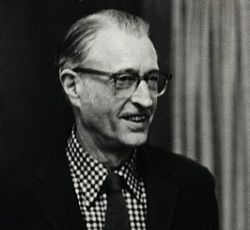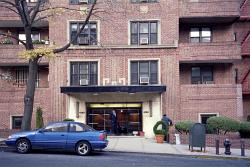 | |||||||
| Home | Email Us | Find It | What's New | Back | Next | ||
| VIEWER MESSAGES | ||
|
| MISCELLANEOUS | ||||
|
||||
 
First Photograph: John Service some time during the 1970's. [Courtesy of Oberlin College Archives, Oberlin, Ohio.]
Second Photograph: The Hampton House Apartments on 82nd Road at Queens Boulevard (2001). Click on images to enlarge. "As the China tragedy unfolded during the late 1940's, many foreign service officers would have their careers destroyed, but of the group,John Paton Davies and John Stewart Service were the most distinguished, and as such, they would suffer the most. Younger men a rank or two below them might quietly leave the Asian bureau and go to another area, their careers damaged but not entirely destroyed, but for Davies and Service, it was the end of two brilliant careers. For the country they served, it would have even darker implications because they were the best of an era, and the Foreign Service does not produce that many men of rare excellence. They were the Asian counterparts of George Kennan, Chip Bohlen and Llewellyn Thompson; under normal conditions they might have stayed in, and by the time the Kennedy Administration arrived, become senior State Department officials, perhaps Assistant Secretary of State for Far Eastern Affairs. They might have been able to provide that rarest of contributions in government, real expertise at a high operational level." [David Halberstam, The Best and the Brightest, 111 - 12 (Randon House 1972).] Click on the following links to view images of John Service on other web sites. Each link will open in a new window. Close out window to return here. |
John Service
References:
- Center for Chinese Studies at the University of California at Berkeley
- The Chinese Civil War
- Chou En-lai (Zhou Enlai)
- John Paton Davies
- The Dixie Mission
- General Joseph Stilwell
- Generalissimo Chiang Kai-shek
- David Halberstam
- History of Sino-American Relations
- George Kennan
- The Kuomintang
- The Long March
- Mao Tse-tung (Mao Zedong)
- Senator Joseph McCarthy
- Richard Nixon's China policy
- Harrison Salisbury
- Service v. Dulles, 354 U.S. 363 (U.S. Supreme Court 1957)
- Barbara Tuchman
- U.S. Foreign Service
- The War in Vietnam
At 43, Service was clearly overqualified for his new job. Handsome, distinguished, and intelligent, he was well spoken and widely traveled. He had a background in history, law, and economics, and was fluent in written and spoken Chinese. Yet, he had come to Kew Gardens under a cloud, with his prior career lost and his personal reputation destroyed. He was determined to regain them both. Although his connection to Kew Gardens was a passing one (he only stayed here a few years), his story is worth telling.
John Service was born the son of missionary parents in the Szechwan (Sichuan) Province of China in 1909. Educated in China and the U.S., he was accepted into the U.S. Foreign Service in 1933. The Great Depression was on, and rather than wait interminably for an appointment to come through, he returned to China at his own expense and secured a clerkship with the U.S. Consulate in Yunnan.
By all accounts, he was a highly capable officer who served well. In 1935, he supervised the safe evacuation of American women and children as Chinese Communist insurgents passed through the area on their famous Long March. Later that year, he was posted to Peiping (Beijing) to study Chinese. The course took two years. Service had U.S. Ambassador Nelson T. Johnson arrange to have him do some political work. Mostly he attended rallies of students and other dissidents.
During World War II, Service was assigned to the staff of General Joseph Stilwell,U.S. Commander in the China-Burma-India theater and Chief of Staff to Generalissimo Chiang Kai-shek, the leader of China�s Nationalist (Kuomintang) Government. Service traveled over large parts of China, seeking out anyone, whether in or out of government, whether communist or noncommunist, who could provide him with useful knowledge. Service and another Foreign Service Officer,John Davies, lobbied hard to establish contact with the Chinese Communists in Yenan (Yan'an) who were fighting the Japanese in northern and eastern China. In the spring of 1944, Chiang Kai-Shek dropped his objections and what was known as the "Dixie Mission" began. Service was the principal political officer during the first six months of the Dixie Mission and had extensive conversations with the Communist rebel leaders, Mao Tse-tung (Mao Zedong) and Chou En-lai (Zhou Enlai). It was the first official contact between the U.S. and the Chinese Communists.
Service, along with other diplomatic and military personnel stationed in China, became an advocate for a change of policy in China. Service was one of the more articulate spokesmen for this point of view. They saw the existing Chinese Nationalist Government as "selfish and corrupt, incapable and obstructive" � certain to lose the civil war with the Chinese Communists that was sure to follow the end of World War II. They did not advocate abandoning the Nationalists, but they did argue that establishing a relationship with the insurgent Communists at that juncture would result in less hostility between the U.S. and any future Communist led China. They also believed such a move might spur Chiang Kai-shek to take a more active role in fighting the Japanese than he had so far been willing to take. The United States had supplied Nationalist China with arms and materiel to fight the Japanese. Chiang had decided instead to hold those supplies in reserve to use against the Communist insurgents figuring that the U.S. war effort would eventually solve the Japanese problem even if China did nothing to help.
The policy recommendations of Service and others were rejected in Washington and Service was recalled to the U.S. in 1945. When the Chinese civil war resumed (as Service predicted it would), the new Ambassador to China, Patrick Hurley, blamed that fact on U.S. Foreign Service officers such as Service who, he said, had pro-Communist sympathies and had sided with the Communists. When the Communists won the civil war in 1949 (as Service also feared they would do), the Hurley allegation came back to haunt him, as did his extensive contacts with the Chinese Communists when he served as political analyst for Ambassador Nelson and General Stilwell.
The fall of China to the communists was followed by the rise of Senator Joseph McCarthy (R) of Wisconsin. McCarthy charged that the defeat of the Nationalist Government was the result of disloyal U.S. State Department officers. One of those named was John Service, whom he described as "a known associate and collaborator with Communists". The bitter irony of it was that Service's contacts with the Chinese Communists had all been in the course of his duties as political analyst for Ambassador Nelson, General Stilwell and the Dixie Mission. Moreover, Service and other Foreign Service China specialists were blamed for the loss of China even though the China policy they had recommended more than 5 years before the Communist victory was not the one the United States followed.
From 1945 to 1950, Service was investigated by a number of governmental agencies operating under increasingly strict standards to determine whether he was either disloyal or a security risk. In each instance, he was cleared of wrongdoing. He was also cleared by a Senate Subcommittee, which said that he should not be branded as disloyal and have his career destroyed "for writing what appears to have been the true facts as he saw them." After the last State Department hearing, Senator McCarthy intervened and persuaded the U.S. Civil Service Commission's Loyalty Review Board to conduct yet another hearing on Service�s fitness to remain in office. Although the Board could not prove any disloyalty on Service�s part, it decided there were doubts about his loyalty, and under Executive Orders issued by President Truman, doubt was all that was needed to remove him.
The Commission advised Truman�s Secretary of State Dean Acheson of its conclusion and demanded that Service be let go. Acheson terminated him the next day on December 14, 1951. Service was forced to leave Washington, and with his loyalty to his country publicly called into question, he found little by way of employment opportunities until a British citizen gave him the job here in New York selling steam heating equipment.
During his years in Kew Gardens, Service worked for vindication. He brought suit on the legality of his dismissal. Five and one half years after Service left Washington in disgrace, The United States Supreme Court, in a unanimous decision, ordered him reinstated to his former position with back pay. Unfortunately, although it was a legal victory, it was not a vindication. The Court never addressed the issue of his loyalty, saying only that Service�s procedural rights had been violated by the manner of his dismissal.
His return to the State Department provided him with no vindication either. He was pushed off into low-level positions, outside his area of expertise, with no hope of advancement. He finally retired from the State Department in 1962.
For John Service, vindication would not come until 1971 when President Richard Nixon broke with over 20 years of U.S. thinking and adopted a China policy that appears indistinguishable from the one John Service had recommended three decades earlier. In 1973, a luncheon in his honor was given by the very same Foreign Service from which he had been dismissed more than 21 years earlier. And in 1994 he received the Foreign Service Cup, an award given annually to a retired Foreign Service officer by Diplomatic and Consular Officers, Retired.
It is said that living well is the best revenge, and if so, Service did achieve a measure of revenge in addition to vindication. He worked for a number of years as library curator of the Center for Chinese Studies at the University of California at Berkeley, and then as editor for the University of California Press. After diplomatic ties with China were reestablished in the early 1970s, Service made numerous trips back to China. On one, he and New York Times reporter Harrison Salisbury, retraced the route of the "Long March". He also belonged to various organizations that promoted better U.S.- China relations. Service passed away at 89. His nemesis, Joseph McCarthy, did not handle adversity so well. Like John Service, McCarthy suffered disgrace (although he did not lose his job). In 1954, he was censured by the U.S. Senate for abuse of power but remained as Senator from Wisconsin. Already known as a drinker, he drank more heavily. His alcoholism in turn aggravated existing health problems. McCarthy developed liver ailments and died of acute hepatitis in 1957 at the age of 49.
The country may have paid a heavy price for the short-circuiting of John Service's diplomatic career. Some observers such as David Halberstam and Barbara Tuchman believe that had their careers taken a normal course, John Service and the other ousted China specialists would have been senior officials in the State Department hierarchy by the time John Kennedy and Lyndon Johnson assumed office, where they would have been in a position to steer both men clear of the policies that led to the War in Vietnam.